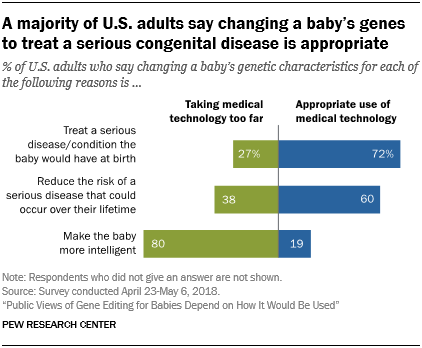Making Cognitive Enhancement Palatable
Building from a widely accepted foundation of IVF to the opposed practice of PGT-P for IQ

In vitro fertilization (IVF) is the process of fertilizing ova with sperm in a laboratory rather than within a woman’s body. Many couples undergo IVF to increase the chance of a successful pregnancy or select an embryo with a low risk of disease. In 2013, only 12% of the American adult population found IVF morally wrong (Pew Research, 2013). Opposition to IVF was even as low as 13% among Catholics, whose official church teachings oppose abortion and hold “that it is ethically unacceptable to dissociate procreation from […] the conjugal act” (Dignitas Personae, 2008, 16).
IVF is not a culture war topic in America. Many children alive today should be grateful. In 2019, there were 83,946 infants born using assisted reproductive technology in the United States (CDC, 2019). Since 1996, more than 1 million children have been born in the United States using assisted reproductive technology (Pew Research, 2018). The lack of opposition is partially a consequence of the practice becoming commonplace without major issues. Also, it is likely thanks to people knowing friends or family members who have used the technology successfully.
If IVF were prohibited immediately due to an overwhelming backlash, perhaps acceptance would not be so high. Many people are guided by either social desirability or initial gut reactions. Ideas like selling organs and human challenge trials seem rather repugnant to many, despite their ability to save lives. I suspect genetic enhancement, especially for cognitive ability, is often opposed because it elicits negative feelings. While there are undoubtedly articulate critics, most people have not considered the costs and benefits, so they are guided more by initial reactions.

Despite most Americans being receptive to changing genes to treat a serious disease or condition, 80% are opposed to increasing intelligence. While the question does not specify gene editing, the survey focused on gene editing. A survey that asked about selecting embryos with higher genotypic intelligence, a process distinct from changing a baby’s genes, may yield higher approval. Unfortunately, the actual survey questions in this Pew Research survey ask about changing a baby’s genes. It is more appropriate to ask about editing an embryo, a less risky process.
Another way of increasing the expected level of intelligence of a future child is through embryo selection. This is not changing a child’s genes but changing which embryo is implanted. For certain genetic variations, this was already common. Clinics would perform preimplantation genetic testing for aneuploidies (PGT-A), structural chromosomal rearrangement (PGT-SR), and monogenic diseases (PGT-M). Most people take no issue with these practices, especially those already accepting IVF.
Recent advances in technology and scientific knowledge have allowed for a new process called preimplantation genetic testing for polygenic traits (PGT-P). Since cognitive ability is polygenic, parents can now select an embryo after considering the future offspring’s potential psychological traits like cognitive ability. This is upsetting to many. The potential backlash to this practice concerns me. I want parents to have the ability to have children that are happy, healthy, and also intelligent.
To defend the practice, I want others to be familiar with arguments and rhetorical strategies. I think the following argument's attempt to bridge the gap from the acceptable practice of IVF to cognitive enhancement makes a lot of sense. When embryo selection is broken down into small individual comparisons, it appears more morally justifiable.
If you find IVF acceptable… it seems reasonable to perform tests that increase the probability of successful implantation and pregnancy.
If you find increasing the chance of a successful pregnancy worthwhile… it seems reasonable to provide a healthy life for a child by not implanting embryos with chromosomal abnormalities or monogenic disorders.
If you find increasing the chance of a healthy child worthwhile regarding monogenic disorders… it should also seem appropriate to consider polygenic conditions like heart disease, arthritis, and diabetes to prevent premature death and disability.
If you find polygenic testing to increase health appropriate… it should also be appealing to reduce the risk of bad mental health conditions such as schizophrenia and clinical depression.
If you find polygenic testing to reduce the risk of psychological disorders acceptable… it seems justified to consider preventing profound intellectual disability, a condition that can tremendously diminish one’s quality of life.
If you find polygenic testing for profound intellectual disability acceptable… it seems unjustified not to support polygenic testing for children who are only moderately or mildly intellectually disabled.
If you find polygenic testing for moderate and mild intellectual disability acceptable… you ought to find it permissible to use polygenic testing to allow selection in cases of borderline intellectual disability. The difference between a disabled IQ of 69 and a non-disabled IQ of 71 is not particularly morally relevant.
No significant individual step between 1 and 7 distinguishes a moral action from a morally prohibited action. The similarity of each step seems to make the next appear morally justified. If you have allowed clinics and parents to use polygenic scores for cognitive ability during IVF, you ought to enable them to consider polygenic scores entirely. If the embryos have been biopsied and the clinician already knows the polygenic scores, they would have to deliberately withhold information from the parents about polygenic scores for cognitive ability, preventing a fully formed reproductive decision on the part of the parents.
What is the exact polygenic score or IQ score that warrants this censorship? One could accept selection to prevent below-average children but object to selecting above-average polygenic scores. Perhaps one would argue selecting above-average embryos is “eugenics.” However, this is an atypical case of eugenics as typically conceived. Some eugenic practices are wrong because they violate people’s rights and cause harm. Ironically, not permitting eugenics in the case of PGT-P for IQ would restrict a mother’s right to make reproductive choices.
One could also argue that it is an unfair advantage to allow parents to select embryos that are above average in their cognitive ability. While this may be true, the appropriate path to unequal access to life-improving technology is not prohibition but subsidy. It is unfair that many children in developing nations do not have access to life-saving vaccines and die prematurely. I do not think this means we need to restrict access to vaccines for reasons of fairness. The appropriate response is trying to expand access. Likewise, we ought to expand access to PGT-P.
Limiting the ability of parents or clinicians to consider above-average polygenic scores for cognitive ability means restricting the ability of clinicians and parents to select the embryo most likely to live the best life. In many cases, not considering cognitive ability means not maximizing health, given that those higher in cognitive ability tend to be less accident-prone and live longer. Furthermore, having higher cognitive ability affords many benefits that improve one’s life, like better educational attainment, salary, and wealth, as well as a reduction in one’s chance of becoming a criminal or chronic welfare recipient.
While some could come up with plausible accounts of why polygenic screening for IQ is unjust, ultimately, those who oppose the practice and advocate bans stand in the way of parents intent on giving their children a better life. Julian Savulescu formulated a reasonable ethical principle called procreative beneficence, which holds:
couples (or single reproducers) should select the child, of the possible children they could have, who is expected to have the best life, or at least as good a life as the others, based on the relevant, available information (Savulescu, 2001)
While cognitive ability is not everything, it is worth considering when creating future people. There are double standards for genetic enhancement. In other contexts, many would agree that intelligence matters. A principle that advocates that we ought to educate children such that they live the best life possible would be eminently reasonable. Analogously, the accepted response to inequality in schooling is to raise the quality of the lacking schools rather than prohibit everybody from attending school, lest some children gain an advantage.
Why the focus on cognitive ability? Cognitive ability has numerous significant socioeconomic correlates that benefit individuals and society. At the extremes of cognitive ability, there is an overrepresentation of those who make world-changing scientific advancements. These advances are either neutral or beneficial to almost everyone. We need brilliant people to prevent global catastrophic risks like asteroids, misaligned artificial intelligence, and climate change. We need people to solve the problems of the current age, like crime, war, famine, disease, and violence that plague humanity. Cognitive enhancement will make the world a much better place.


People have an intuitive egalitarian instinct, which has existed as far back as our Hunter gatherer days. They derive value from knocking the top down, despite this action lacking any principled justification.
The leveling down objection should make it clear that inequality is not inherently bad, yet that conclusion contradicts people’s (flawed) moral intuitions.
If it is unethical to handicap the cognitive abilities of those at the top, it should be similarly unethical to deny cognitive enhancements to those who would otherwise reach the top.
I really try to be open-minded and steel manning as much possible, but it really is beyond my comprehension why would someone oppose making your children healthier and smarter. Someone with more money than me should make a study about the type of messaging or branding that makes PGT-P more palatable to normies. Making PGT-P mainstream should be one of humanity's biggest priorities.
Something interesting that came to my mind while reading this article is the following:
Some readers may be familiar with the IQ communication range. This is the idea that if there is a large gap in IQ between two individuals (say, two standard deviations and above), it becomes difficult to form meaningful relationships and communicate effectively. This is specially true for relationships between superiors and subordinates. I can imagine this becoming a problem for parents who cognitively enhance their children. Would you give your child a much higher IQ for the opportunities that it entails if you know it's going to damage your relationship, and that you will be the obvious intellectual inferior of your own child?